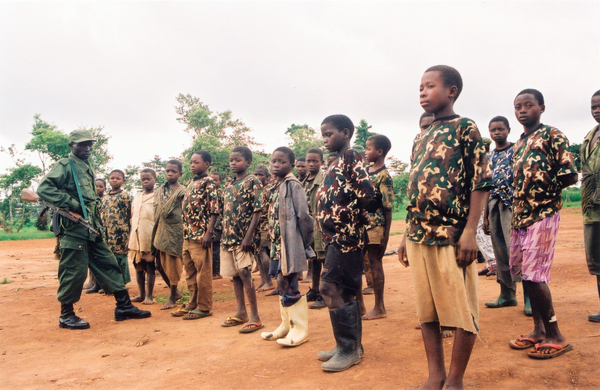In a victory for children in war-torn Democratic Republic of Congo, the DRC government recentlysigned a plan of action with the UN to eliminate the recruitment and use of child soldiers in their military forces, including a first-of-its-kind plan for protecting children from sexual violence.
This historic step comes after several years in which the Government of the DRC had part of its US military aid withheld under the landmark Child Soldier Prevention Act (CSPA). Moving forward, it is imperative that the world and the United States keep a close watch to ensure there is a robust implementation of the national action plan including, for example thorough screening processes to prevent child soldiers recruited into the M23 rebel forces from joining the DRC military. It is arguable that given the links between M23 and the government of Rwanda restrictions on US aid should also considered for Kigali. Whether there is effective pressure on Rwanda and M23 or not, the decision to grant the DRC a partial waiver, allowing some military assistance to go forward must be leveraged to keep the government of President Kabila on track with further incentives tied to specific benchmarks.
While developments in the DRC represent a step forward more can and must be done in particular in Yemen and South Sudan where the Obama Administration recently renewed waivers under the CSPA for both countries and for Chad, which was removed from the sanctions list altogether.
While Chad was removed from the list of states that had US military assistance suspended, based on progress toward eliminating the practice in 2011 recent, UN reports indicate that this assessment may have been premature.
The Administration’s argument that South Sudan is not technically subject to the CSPA because they were not a country until after the law went into effect might meet a legal standard of credibility but it does not do much for the children of South Sudan nor does seem portray US leadership on this critical issue in a very positive light. There may be legitimate humanitarian and national security reasons to allow military aid to South Sudan but the Obama administration must do more to prevent the use of child soldiers in this war-torn country including by the Sudan People’s Liberation Army.
Finally, Yemen was granted a full waiver on national security grounds, despite the fact that children continue to be recruited into government armed forces. Once again the rights and the future of the children of Yemen have been trumped under a now all too familiar argument.
Withholding portions of military aid is not a cure-all, and other means of pressuring these governments must be implemented, along with incentives. Simply discounting the rights of these children is shortsighted and undercuts the credibility of the Child Soldier Prevention Act and US leadership on the issue. It is encouraging that progress is being made in the DRC; the US must continue to do everything in its power to protect children across the globe from being forced into armed conflict.

Children have the right to live their carefree, do not teach them violence, they are our future. Now the world has only a scream … Peace …. We act as if we do not ever die and die without ever having lived. A Good Start. So go ahead ….
It's a good thing this problem is being addressed, but I can't help but think it's outrageous that this was even an issue in the first place.
It makes me really happy that people are finally doing something to help these children. I am studying the use of children soldiers in Rwanda currently and I am wondering if there is any one who can help give me more information on that?